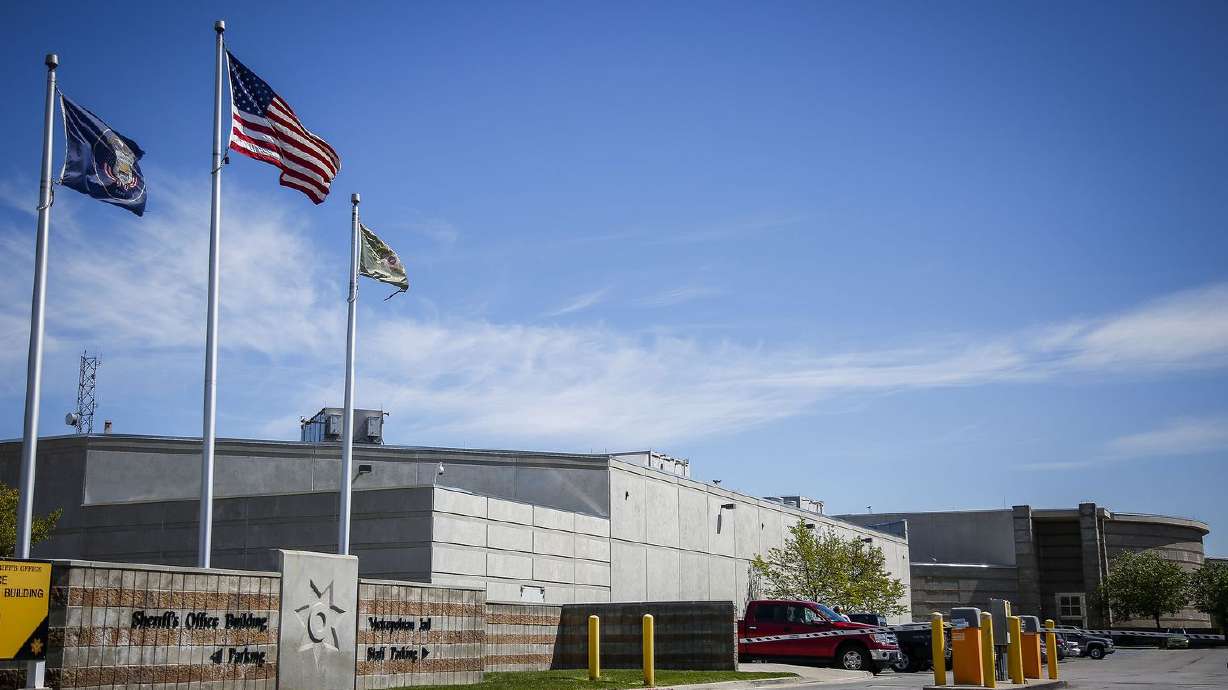Estimated read time: 4-5 minutes
This archived news story is available only for your personal, non-commercial use. Information in the story may be outdated or superseded by additional information. Reading or replaying the story in its archived form does not constitute a republication of the story.
SALT LAKE CITY — Utah doctors noticed something else while treating a man for a suspected overdose in late March.
Like a growing number of patients, he had fluid in his lungs, an indication he had the new coronavirus. But unlike most, he had just finished a stint at the Salt Lake County Jail.
Three days later, the jail learned he’d tested positive and began screening other inmates for symptoms. Within the next 48 hours, another in his same housing unit developed a cough and fever.
Since then, at least 14 other inmates at the jail and 18 employees have tested positive for the coronavirus amid swift measures to contain it, the county wrote in new court filings. As of Monday, there were no longer any confirmed cases in the jail, a development Salt Lake County Sheriff Rosie Rivera heralded as a success.
“Through quick quarantine protocols, contact tracing and medical treatment, our dedicated employees were able to take us from being the first Utah jail with COVID-19-positive inmates to being free of the virus in our inmate population within about three weeks,” Rivera said. She has not indicated how many of the roughly 1,300 held there have been tested.
The court documents made available Monday provide the first details on the spread of the coronavirus in the jail, the state’s only to confirm cases among inmates so far. They come in response to a lawsuit from civil rights advocates, part of a national effort to free defendants seen as vulnerable in tight quarters.
“During an already challenging time, this lawsuit added an unnecessary burden,” Rivera said. The last positive result came April 15, Rivera said Monday, and the most recent inmate to test positive was released April 23.
On March 31, as the second inmate’s temperature rose, about 50 others who had been in the same housing unit were moved to a previously empty section of the jail, where they had their own cells with intercoms and were evaluated daily, according to the sheriff’s office.
The same day, the jail learned an employee who runs its gardening program and another who recently worked a graveyard shift both tested positive.
Although she never tested positive for the virus, the gardener’s wife — a fellow jail employee who supervises its laundry workshop — was sent home when she showed up for work April 1. The 18 women inmates she oversees were moved to single cells as part of a quarantine protocol.
But the virus had already crept in. Over the next three days, two laundry workers and a third woman housed near them fell ill. A fourth, pregnant and withdrawing from opioid addiction, was taken to a hospital. Within a week, a man on backup laundry duty and more than a half-dozen others showed symptoms.
Related:
In more than 100 pages of court documents filed Saturday, attorneys for the county argued the jail took swift action to isolate each who tested positive in a medical unit, quarantine others they came in contact with and screened inmates daily for symptoms.
Before the virus made its way inside, the jail had already taken steps like calling off visits and offering free phone calls instead, taking the temperatures of anyone who entered the jail and obtaining masks.
Groups including the American Civil Liberties Union of Utah and the state’s chapter of the Disability Law Center argue that’s not enough, and more could be released even with public safety in mind. In an emergency petition filed with the Utah Supreme Court on April 2, they advocated for the release of those awaiting trial, those whose sentences will expire in six months, and those who are older or have health problems.
The groups argued Utah lockups aren’t equipped to handle an outbreak and have not taken adequate precautions like providing enough hand sanitizer and soap. Moreover, the threat of the virus amounts to cruel and unusual punishment, they said.
The court has not yet ruled.
In its response to the suit, Salt Lake County pointed out that prosecutors worked with defense attorneys to secure the release of dozens of nonviolent offenders and the jail approved others for early release.
Those who remain behind bars, the county said, pose a public safety threat.
As of April 20, about 1 in 4 of roughly 1,400 inmates were held on domestic violence charges. Any inmates held there in April faced either violent charges or first- and second-degree felonies, the county said.
None of its staff who tested positive — four civilians and 14 deputies — had symptoms while at work, according to the jail. While one was hospitalized and placed on a ventilator after doctors diagnosed him with COVID-19 and pneumonia, no others were in serious condition.
The county said it asked the county’s health department director, Gary Edwards, to approve a plan to test each employee at its Oxbow facility as a precaution, but he declined due to the jail’s low infection rate, compared to other facilities like nursing homes.
The Utah Crime Victims Legal Clinic has also waded into the case, writing in court documents that victims have a stake in the release of offenders and should be allowed to voice their concerns in court.
A hearing has not yet been set.










